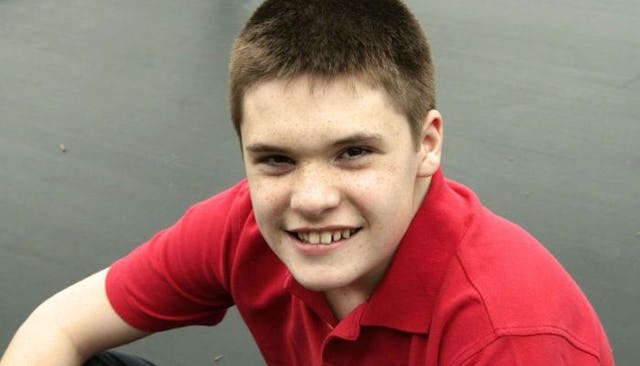When It's Time To Stop Living With Your Autistic Teen

Griffin tromps through the front door holding his fast food sack and soda with one hand and dumps his blue backpack on the floor in the hall. I come over to give him a hug that he more or less returns. On Sundays he spends the afternoon with us. My husband, Jeff, and I have five kids, and Griffin is the middle kid. He is the boy half of a set of boy/girl twins, and was born second. He has big man hands and the sweetest, rarest, dimpled smile. When he was 17, we made the heart-wrenching decision to place him in an ICF/IID, or Intermediate Care Facility for Individuals with Intellectual Disabilities, more commonly called a group home.
RELATED: Awesome Activities For Teens With Autism That Help Develop Important Skills
In the year before he moved out, Griffin was violent, sexually aggressive and prone to smearing his own feces. Looking back, I should have been trying harder to place him sooner, for his sake and for the safety of my other children—not to mention myself and my husband and our skyrocketing anxiety and stress. Griffin has what the DSM-V calls Autism Spectrum Disorder, Level 3. This is commonly called severe, or classic, autism. He can say a few words, but is mostly nonverbal. He has an extreme version of pica, and must be carefully watched to keep him from ingesting something harmful. He wears diapers despite years of toilet training. Adolescent hormones combined with some astonishingly rapid supersizing made him a volatile and impressive assailant. The frequency and severity of Griffin’s more disturbing or unsafe behaviors escalated in that final year until we were prisoners living in a war zone. The unspeakable became common.
I remember going into Griffin’s room to wake him up, only to find that he had purposely removed a clean diaper, defecated in his bed and smeared it on his face. When you are the person who takes care of him in such situations, you have to shove down every ounce of disgust and clean him up and his bedding and his mouth and under his fingernails (because it got up to his mouth somehow) and maybe this makes you sad, and angry, and maybe you tell yourself to shake it off, but aren’t doing so well with that (and maybe you start referring to yourself in the second person—as if that’s any kind of detachment).
We had daily violent episodes. Generally, Jeff was his main target, though even I got kicked in the face and punched in the stomach. Jeff could usually keep Griffin from hurting him, protect the other kids, and mostly not hurt Griffin in the process. However, sometimes Griffin’s biceps would be bruised from Jeff trying to hold him at bay.
Once in a while, there would be tiny moments of humor, like when Jeff was keeping Griffin from attacking the other kids, and Griffin put his enormous teenage man-paw on Jeff’s wrist and raised his opposite fist. In a fit of wild inspiration, Jeff said “Not today, Zurg!” like a demented parental Buzz Lightyear and it startled Griffin so much, he let go and wandered off. They repeated that scene every few minutes for the rest of the evening. Sadly, it didn’t work again after that night.
In the grocery store, a week after his placement, I start crying because we don’t buy lactose intolerant milk anymore, or Pop-Tarts. For the first six months, I cry every time I see him. The combination of crushing guilt, anxiety about how he’s doing, and just plain missing him chokes me into tears.
On Sundays, as soon as Griffin walks in my door, I am reviewing a mental checklist of criticism: Has his hair been cut? Has he been shaved? How clean are his fingernails? How chewed up is his shirt? Is he wet and not changed?
The sad fact is that no matter how often the group home fails to meet my exacting standards, they are still doing so much better than I did. For one thing they have eyes on him 24/7. Even when we were pushing ourselves to the breaking point, we never managed that; after all, we had four other kids and full-time jobs. This placement was the best thing for my family, and for Griffin, but it’s hard not to feel guilty for feeling relieved. It’s also hard not to react when Griffin wants to immediately go over a calendar when he sees me, so that I will point out all the Sundays and reassure him that he’ll be visiting. Of course he longs for me sometimes. I long for him. Living at home isn’t the right thing for us though.
For nine years, Griffin has been on a waiting list for funds to support him living at home. I assume his name will get to the top in the next year or two. If we had been able to access those funds sooner, maybe this would have turned out differently, but now, even when his name finally makes it to the top of that list, I plan to decline.
This article was originally published on